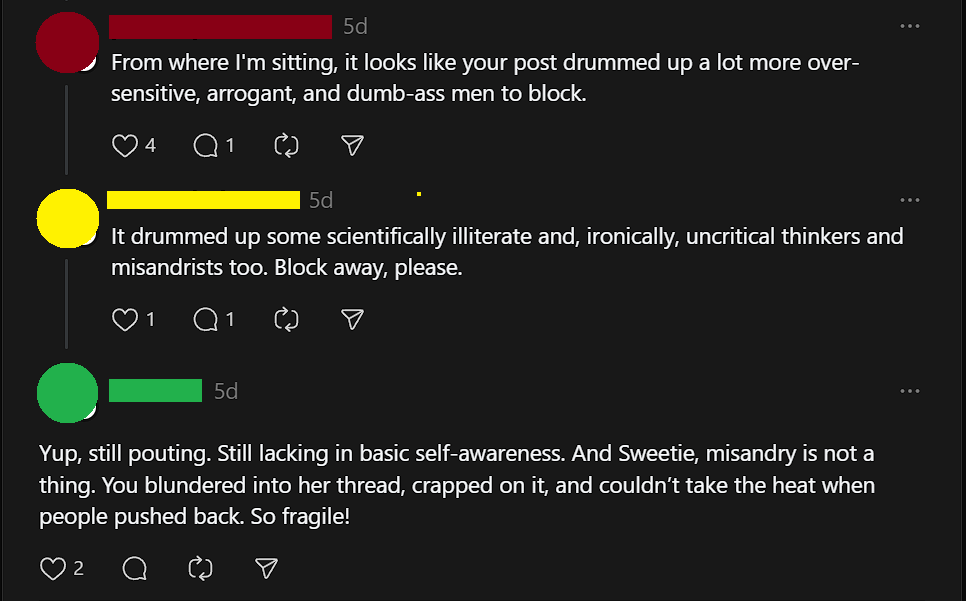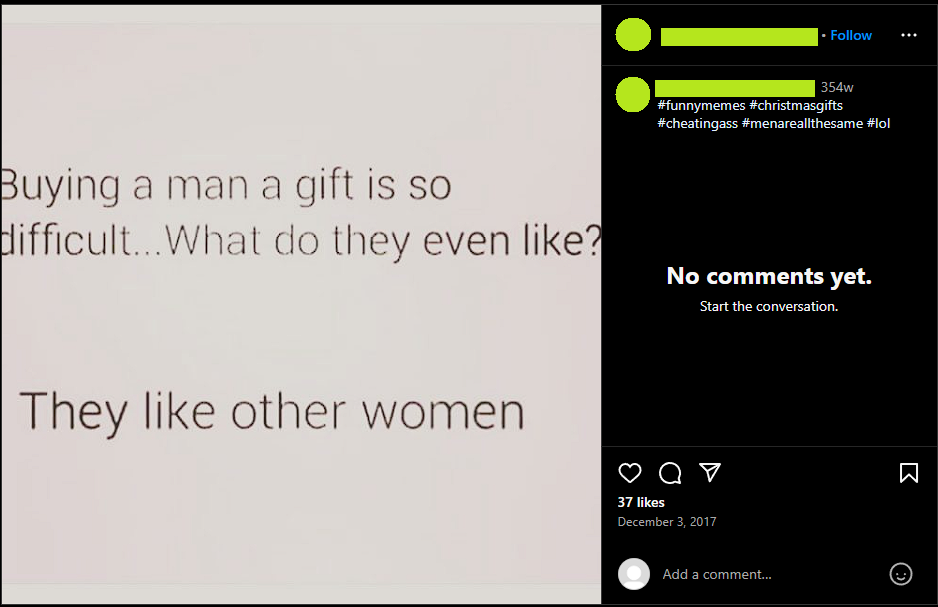The word “misandry” comes from the Greek that literally translates to “hatred of males”. Like misogyny, hatred of women, it refers to a negative perception or treatment of an individual based exclusively on gender.
Less prolific than misogyny, misandry has generally received less attention and is less well moderated by many mainstream social media platforms than misogyny. It is also commonly downplayed or dismissed entirely, sometimes with the argument that it is not a “real” form of discrimination as men have never been a disempowered and oppressed minority. Misandry is also often depicted as a response to misogyny and therefore non-existent except within the context of a response to female oppression.
There have been some high profile cases that shone a light on misandry. In the United States, Florida clothing company David & Goliath went viral with a range of items featuring a cartoon of a boy running away from flying rocks and the slogan “Boys are stupid, throw rocks at them!” There was an outrage but the brand welcomed it as it only increased sales. Vice reported how David & Goliath “turbocharged a strange and surreal phenomenon of brands commodifying anger towards men” and how the phenomena has continued to grow.
In Australia the most well known misandry debates have been around the social media antics of feminist writer Clementine Ford. She was once cancelled from speaking at a fundraiser for the suicide prevention charity Lifeline in response to a change.org petition over her tweets saying “kill all men”. Speaking to the ABC while promoting a new book she said, “There are some nice little Twitter collages out there collating tweets where I say ‘kill all men’ and ‘let’s send all men to the bottom of the sea’ etc…. When I tweet ‘kill all men’ obviously I am having a joke at the expense of the fact that feminists are called man haters who want to see an eradication of the male species. OBVIOUSLY that’s a joke.”
As western society has shifted to equality for all people, the misandry cannot be ignored in daily life and online activity. Nor can it be excused as being “just a joke”, a position some platforms once took to content promoting rape.
Examples
A woman on Threads complained that uneducated males were disagreeing with statements she had made regarding scientific matters. The resulting discussion about her credentials engendered these comments.

The red commenter displays a view of some men as unintelligent both intellectually and emotionally. The Idea that these men cannot stand to be wrong is ironic as it is directly opposed to another problematic stereotype which is that in a heterosexual marriage the wife is always right, and the man always must accept that he is wrong even if his point is correct. The language of the comment supports one of the misandric narratives that men are stupid or cannot think properly.
When called out for misandry the green commenter explicitly states that “misandry is not a thing”.
This clip was posted to TikTok displaying a person happily dancing as a reaction to being called sexist towards men. Some of the comments are shown below.

This commenter suggests that all men deserve to be discriminated against for actions committed against women historically. The idea that all men should have to atone for the wrongs they have not personally committed is a common to many narratives of misandry.

This commenter shares a definition of racism and sexism that is prolific in discussions surrounding both topics. It is used to rationalise or excuse discrimination or abuse by stating that it is not possible for any act or statement to be discriminatory towards a certain group. This is itself a form of discrimination. The definition does not match what can be found in dictionaries or encyclopedias. While the term “sexism” was first used among women’s rights activists to highlight the oppression of women, it always meant discrimination based on sex or gender without specifying which sex or gender.

This commenter uses FGM as an excuse to legitimise misandry. FGM stands for Female Genital Mutilation. FGM is most commonly practiced culturally in parts of Africa but is also practiced in some places in Asia and the middle east. FGM refers to any procedure used to partially or entirely remove the external genitalia of females for non-medical reasons. It is illegal throughout most of the world. While the continued existence of FGM is horrific, the fact it still occurs in some places is not a valid reason to engage in generalised hate or discrimination against all men everywhere.
Another common stereotype of men is a fixation on sexual gratification which goes hand in hand with the stereotype that men are compulsively unfaithful in relationships. This is sometimes attributed to the evolutionary drive to ensure continuation of a species, and is often phrased in a way to indicate that men can’t help it. Phrases used to express these views include “men are all dogs’, “men only want one thing”, and “men are cheaters”. Interestingly, men are seldom referred to as whores, sluts, or other terms commonly in misogyny based attacks against women.

This post on X portrays all men as cheaters regardless of how well a relationship is doing, how good a person the woman is, or any steps taken to convince the man not to cheat. The view expressed is that nothing can change a man from the cheating ways of men.

Here a woman complains that it is difficult to find a gift that a man would like because what a man would like most is some other woman. The hashtags used in the post are indicative of a negative view of men in general: “#cheatingass #menareallthesame”.
The idea that men are only interested in sex is taken to the extreme in some cases where men are labelled generally as rapists. This extends to the idea that men cannot be raped as they want sex regardless of circumstance. The idea is extended even further by including other actions that are not sexual in nature in the definition of rape.

This comment was in response to a post on X that stated that the idea that men couldn’t be raped was a myth. The commenter states that only sexual relations with a male can only be considered rape if the male is below the age of consent. They further state that an adult male can not be raped in any circumstance.
A similar concept has arisen as the phrase “not all men” has become an argument to the line “all men are rapists”. The response that, it may not be all men but it is always a man, has become common as shown by these three nearly identical comments from three different users on three separate posts on LinkedIn discussing the problem of rape in society.



Each of these comments expresses the belief that women either don’t or can’t rape. That whatever a woman may do to a man cannot be construed as rape. That if it is rape it is always a man that has done it.
Conclusion
There is still much work to be done before all people in the world can be considered equal. There are some places where oppression and abuse are still considered normal. These things are not an excuse to treat others poorly. If we justify our discrimination based on historical wrongs, or blame groups of people for the actions of individuals from that group, we will perpetuate the cycle of discrimination and inequality indefinitely. While there is rightly more focus on more frequently occurring types of abuse, denying a problem like misandry exists, or justifying it, is still a promotion of hate.
